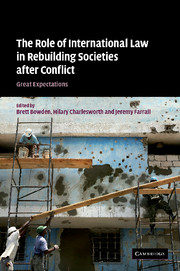Book contents
- Frontmatter
- Contents
- Contributors
- Preface
- Abbreviations
- Introduction
- 1 The ‘state-building enterprise’: Legal doctrine, progress narratives and managerial governance
- 2 Democratisation, state-building and politics as technology
- 3 International law, human rights and the transformative occupation of Iraq
- 4 Defining democracy in international institutions
- 5 Democracy and legitimation: Challenges in the reconstitution of political processes in Afghanistan
- 6 Impossible expectations? The UN Security Council's promotion of the rule of law after conflict
- 7 Legal pluralism and the challenge of building the rule of law in post-conflict states: A case study of Timor-Leste
- 8 From paper to practice: The role of treaty ratification post-conflict
- 9 Selective universality? Human-rights accountability of the UN in post-conflict operations
- 10 ‘Security starts with the law’: The role of international law in the protection of women's security post-conflict
- 11 Grappling in the Great Lakes: The challenges of international justice in Rwanda, the Democratic Republic of Congo and Uganda
- Conclusion: Hope and humility for weavers with international law
- Select Bibliography
- Index
11 - Grappling in the Great Lakes: The challenges of international justice in Rwanda, the Democratic Republic of Congo and Uganda
Published online by Cambridge University Press: 31 August 2009
- Frontmatter
- Contents
- Contributors
- Preface
- Abbreviations
- Introduction
- 1 The ‘state-building enterprise’: Legal doctrine, progress narratives and managerial governance
- 2 Democratisation, state-building and politics as technology
- 3 International law, human rights and the transformative occupation of Iraq
- 4 Defining democracy in international institutions
- 5 Democracy and legitimation: Challenges in the reconstitution of political processes in Afghanistan
- 6 Impossible expectations? The UN Security Council's promotion of the rule of law after conflict
- 7 Legal pluralism and the challenge of building the rule of law in post-conflict states: A case study of Timor-Leste
- 8 From paper to practice: The role of treaty ratification post-conflict
- 9 Selective universality? Human-rights accountability of the UN in post-conflict operations
- 10 ‘Security starts with the law’: The role of international law in the protection of women's security post-conflict
- 11 Grappling in the Great Lakes: The challenges of international justice in Rwanda, the Democratic Republic of Congo and Uganda
- Conclusion: Hope and humility for weavers with international law
- Select Bibliography
- Index
Summary
Introduction
For the last twenty years, the Great Lakes region of Africa has experienced some of the most violent and destructive conflict in the world. Consequently, the region has become a focus for international justice institutions mandated to investigate and prosecute cases of mass crimes. Since 1986, the civil war in northern Uganda between the Ugandan government and the Lord's Resistance Army (LRA), a rebel force infamous for its abduction and enlistment of children, has killed tens of thousands of civilians. Meanwhile, a government policy of forced displacement has driven an estimated 1.7 million people, nearly 90 per cent of the total northern Ugandan population, into 200 squalid camps for internally displaced persons (IDPs). In 1994 in Rwanda, between 500,000 and 1 million Tutsi and their Hutu and Twa sympathisers were systematically murdered in a genocide that lasted a little over three months. The génocidaires, many of whom knew their victims personally, often killed intimately, with basic weapons such as machetes, hoes and spiked clubs, known as panga, and usually near victims’ homes. The conflict in eastern Democratic Republic of Congo (DRC), which was in part incited by the overflow of genocidal ideology from Rwanda and has involved up to seven African nations (including Rwanda and Uganda), has since 1998 claimed nearly 4 million lives and displaced around the same number. On average 38,000 people per month continue to die from violence and conflict-related disease and deprivation.
- Type
- Chapter
- Information
- The Role of International Law in Rebuilding Societies after ConflictGreat Expectations, pp. 244 - 269Publisher: Cambridge University PressPrint publication year: 2009
- 5
- Cited by

